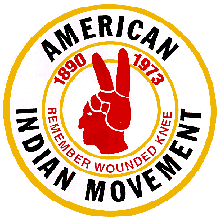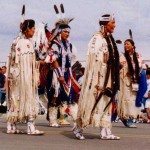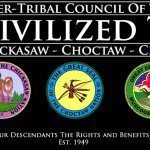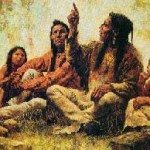From: Bobby Castillo
American Indian Movement
aimca@igc.apc.org
American Indian Movement Autonomous Confederation
GENEVA, SWITZERLAND OCTOBER 24, 1996
ON THE OCCASION OF THE MEETING OF THE UNITED NATIONS
OPEN-ENDED INTERSESSIONAL WORKING GROUP CONSIDERING
THE DRAFT DECLARATION ON THE RIGHTS OF INDIGENOUS PEOPLES
The American Indian Movement is a legitimate National Liberation Organization in the original indigenous territories of North America now claimed by the United States. We have been active at the United Nations since before there was a Working Group on Indigenous Peoples and before there was a Draft Declaration. It is because of our long-standing work in this forum that we feel compelled to inform you why we are leaving this process today.
When Indigenous Peoples first arrived at the UN in 1977 the world was a different place. The possibilities for a genuine and respectful expansion of fundamental human rights, especially the right for all peoples to be free from colonial domination, seemed great. We took seriously, as we thought the members of the United Nations did, high-sounding principles such as the self-determination of peoples, and ideals such as the promotion of world peace and cooperation. We came here, with our other indigenous sisters and brothers, to bring revolutionary vision and change to a narrow and moribund United Nations system, not to acquiesce in it, or to accept it fatalistically. We brought the goodwill and the dignity of our peoples and nations to this foreign place in a optimistic attempt to vindicate the rights of our future generations. Now that has neither the need nor the desire to assist us in the de colonization of our peoples and our homelands.
What we have been met with here in Geneva is the all too familiar atmosphere of duplicity, deceit, and disrespect that we receive from the invader states in our homelands. In 1492, the year that our territories were first invaded by European colonialism, the Spanish scholar Nebrija stated that language is the perfect instrument of empire. Over the centuries, we as indigenous peoples have come to realize the truth of Nebrija’s forthrightness in describing the methods by which language is used in the legal and political processes of the settler states to suppress us. We are now shocked and dismayed that the process of considering the Draft Declaration is being captured by a similar imperial ideological perspective, and is itself becoming a tool of continuing colonization, empire, and genocide against indigenous peoples.
Specifically, hollow pronouncements that the working group will proceed on the grounds that indigenous peoples will be allowed full and effective participation along with state governments, have meant that indigenous peoples are allowed to comment on the draft, but that states alone will retain the sole right to determine the ultimate complexion and content of the Draft that will impact us. Such an arrangement cannot honestly be construed as the genuine partnership with indigenous peoples that the United Nations has claimed to desire.
When asked to respond to the three reasonable request of the indigenous caucus, namely:
That the Draft Declaration be accepted at this session of the Working Group without negotiation, changes, amendments or deletions;
That the proposed agenda be altered to provide an opportunity for substantive debate on the most critical aspects of the Draft, such as the right of indigenous peoples to exercise self-determination, indigenous territorial rights, treaty rights, and other collective rights. Articles of the draft should not be re-grouped or otherwise subject to suggestion for alteration or revision;
That the rules of procedure for the Working Group be suspended to allow for the genuine, full, effective and co-equal participation of both states and indigenous peoples. Participation is meaningless without the consensus of the Working Group also including the decision-making contribution of indigenous peoples and nations on an equal level with states.
In reaction to the indigenous caucus request, only six states availed themselves of the opportunity to respond, and they in relatively mild or couched language. It was only our indigenous relatives from Fiji who had the good will to address and support our reasonable request fully. Other states made high-sounding statements about how indigenous “input (as opposed to genuine participation) will be indispensable,” or that indigenous participation is “absolutely fundamental,” to the discussion of the Draft. Yet, when almost all indigenous peoples withdrew from the session in frustration, the states proceeded with the regrouping and suggested text changes in the Draft. On the third point, absolutely no states responded to the need to adopt structural changes that would provide for co-equal indigenous participation in the operation of the Working Group.
It is clear that the Draft is already an expression of compromised aspirations of indigenous peoples. Virtually all indigenous peoples acknowledge that the Draft is an imperfect document that represents, at most a minimum standard of the rights of indigenous peoples. At this session of the open-ended working group, indigenous delegates made it clear that no changes that would serve to weaken the document would be acceptable. Despite this clear indigenous position, states have taken great liberty in suggesting changes and alterations to the Draft, designed to destroy most of the positive content of an admittedly imperfect document. Several states have made it clear that the Draft, after twelve years of debate in which every state in this Working Group had an opportunity to participate, will not be passed in its current form. To ask indigenous peoples after twelve years of work on the Draft, as the chairman of the Working Group asked, to expect the current discussions to continue for an additional seven to ten years, is both unnecessary and intolerable. Indigenous peoples are confronted on a daily basis with matters of life and death, of invasion, theft and survival. To expect us to devote critical time, resources and energy to a process that does not genuinely respect or welcome our legitimate, co-equal, decision-making participation, is unreasonable. To expect us to devote another several years to an unequal and confining process that may, in the end, harm us more than assist us, is unacceptable.
It is also clear that powerful states, such as the United States, will not allow a genuine expression of self-determination, collective rights, or territorial rights to be embodied in the Draft. It is apparent that such state positions, and these United Nations processes which legitimize them, are clearly intended to effect the further “domestication” of all indigenous peoples. We will not consent to be part of such oppressive processes.
We will not allow our presence or our participation in this forum, a forum which is organized in a manner that is contrary and hostile to our own understanding of respect and participation, to be construed as lending either tacit or active consent to this process. We leave this statement as an expression of active opposition to any and all processes that seek to address matters of fundamental concern to us, but that marginalize our authority to affect the ultimate articulation of jour rights and our interests. This statement, however, should not be judged as a mere complaint or nay saying. In the continuing spirit of mutual respect, and in the hope that we might again sit in dialogue with each other, either in your territories or ours, to discuss our mutual concerns, we provide the following recommendations:
That the Draft Declaration on the Rights of Indigenous Peoples, after twelve years of consideration, discussion and debate in the working Group on Indigenous Peoples, with the extensive participation of indigenous delegates, and with full opportunity of states to contribute to the discussion, should be adopted at this session of the Working Group as the minimum international standard of the rights of indigenous peoples and nations. If states are unwilling to accept this reasonable, albeit flawed, version of the Draft, then we as indigenous peoples and nations should assert our right to strengthen the articles that have already been diluted, and/or to meet independently of the United Nations to revive our own Declaration to stand as an alternative to the ultimate state version that will almost inevitably result from the current process.
That any and all future sessions of United Nations bodies concerned with the Draft Declaration on the rights of Indigenous Peoples have the conventional rules of procedure suspended so as to allow the full, effective and co-equal, decision-making (including consensus making and/or voting) participation of indigenous peoples/nations and member states concerned.
That indigenous nations and peoples, including and especially traditional representation, and not simply those tribal or indigenous governments whose legitimacy is defined or recognized by the states, be seated within and among states, on the basis of co-equality and in the spirit of the partnership described in the proclamation of the UN Decade for Indigenous Peoples
That sessions of future meetings discussing the Draft Declaration on the Rights of Indigenous Peoples convene in United Nations regional centers, such as in Bangkok, Thailand or Santiago, Chile to afford indigenous peoples a greater opportunity to participate in the deliberations on a more affordable, and a more participatory, basis. In conclusion, we have come to the realization that the processes in this body have become too arbitrary, oppressive and disrespectful of our status as indigenous nations and peoples to continue our participation. Some states will delight in our departure, but we put them on notice that they have not seen the last of us. We will continue to advance the battle for indigenous peoples’ rights wherever we are, and we will continue to support, in every spiritual and physical way available to us, our indigenous brothers and sisters who remain here, and wherever they struggle. Despite all attempts by our enemies to divide us, we as the original peoples of the earth remain steadfast and strong. Perhaps, when we believe that a sufficient level of mutual respect and cooperation has developed in these halls, we may even return here to the United Nations, In the meanwhile, we will return to our homelands to assert our rights where the terrain is a bit more familiar and where the battleground is a little more level.
AMERICAN INDIAN MOVEMENT
International Confederation of Autonomous Chapters
Russell Means – Spokesperson
Glenn Morris
Phyliss Young
Sharon Venne
Bobby Castillo
Susana Sleeping Bear
Josh Dillabaugh
Mona Roy Dillabaugh
Lori Pourier
Crystal Echohawk







